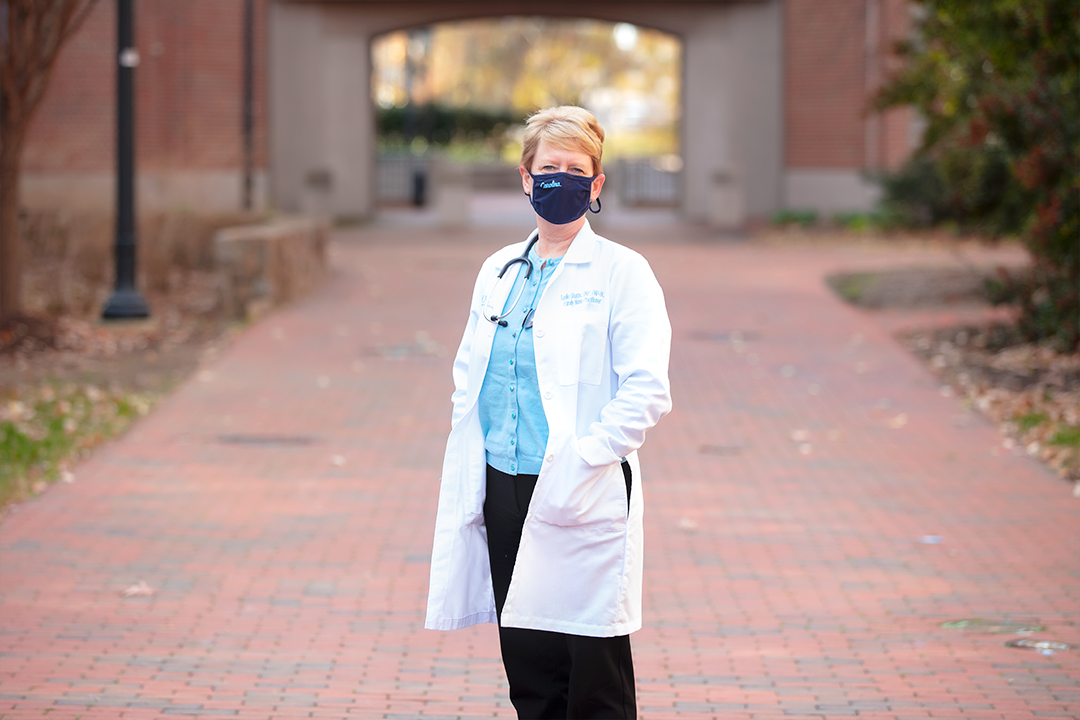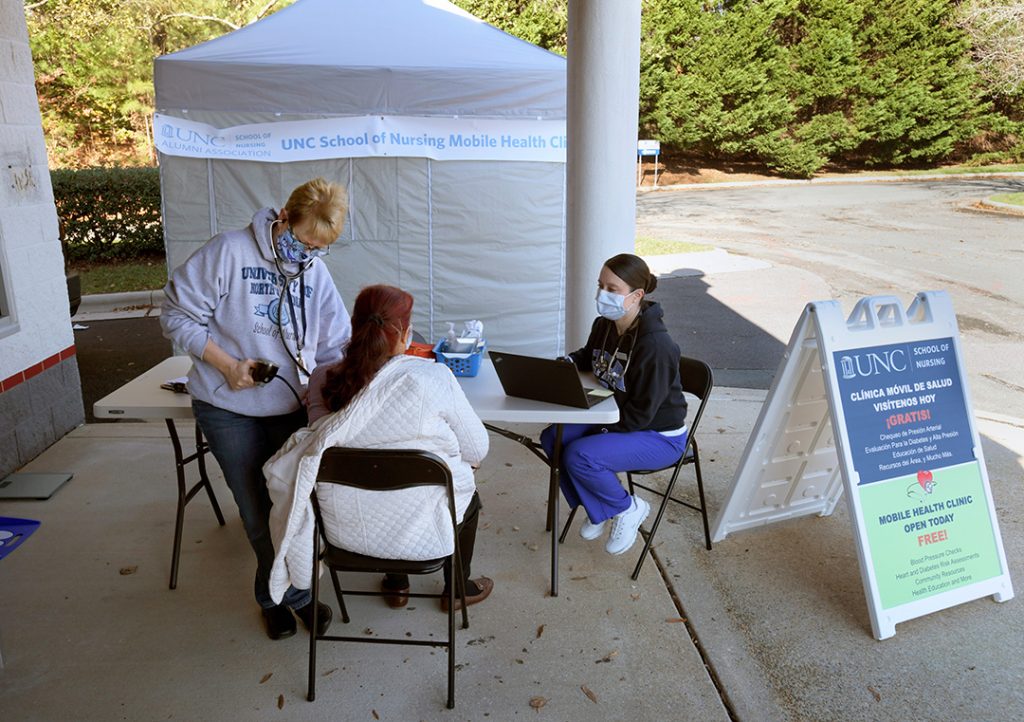


Wake County residents who face health or financial crises now have an easier road to healthier lives: the Mobile Health Clinic led by UNC School of Nursing faculty
In the midst of the COVID-19 pandemic, local communities need health education and basic care now more than ever. Many North Carolinians have lost their jobs and, in turn, their health care. But one University of North Carolina at Chapel Hill assistant professor in the School of Nursing is serving others through the school’s Mobile Health Clinic. The clinic promotes wellness, assesses those at risk for health problems and helps people manage chronic diseases.
Launched in 2016 by Dr. Marianne Cockroft, Associate Professor of Public Health and Community Practice at the School of Nursing, the Mobile Health Clinic provides free nursing services to meet the health care needs of clients of Wake County crisis ministries. Staffed by nursing faculty who are registered nurses and nurse practitioners, the clinic serves people who have not made connections in health care, including the underinsured and uninsured. The clinic also serves as a dedicated learning site for undergraduate and graduate nursing students.
Although the clinic has made a significant impact on the lives of many, it faced closure in recent years due to the lack of funding. But Carolina alumna and assistant professor of nursing Leslie Sharpe used her participation in the Chancellor’s Faculty Innovation Workshop and her more than 30 years’ experience as a nurse to work with Cockroft to reinvigorate the Mobile Health Clinic. Open to UNC-Chapel Hill faculty who are nominated by their deans and invited by the Chancellor, the workshop is led by Innovate Carolina and incorporates design-thinking and lean startup methodologies. It strengthens skills in ideation, problem solving, team building and entrepreneurial practices that can help faculty take an idea through to successful implementation and impact.
“I wanted to clarify direction for the clinic as well as figure out how the clinic could be sustainable,” says Sharpe. “It was really just amazing because, through the workshop, it became very clear that all members of the organization need to understand and agree on the mission and goals of the organization in order to succeed and find direction.”
Beyond the workshop, Sharpe worked with Melissa Carrier, director of social innovation at Innovate Carolina, who helped her think through additional strategies.
“Working with Melissa really helped me clarify what we were doing as a clinic and what we wanted to do,” adds Sharpe. “Because we do not have the resources to provide primary care in this mobile health setting, we were able to reaffirm our role as screeners, educators and connectors. In the grand scheme of things, if we can prevent the onset of illness with our clients, we can potentially help lower health care costs in our community.”
For its clients, the walk-up clinic offers an easy way to access services like sick care visits, blood pressure checks, diabetes and cholesterol assessments as well as mental health screenings – all free of charge. Clients also receive education and connections to resources for dental health, vision health and even food pantries. The clinic provides interpreting services through a language line or bilingual staff. Currently, the Mobile Health Clinic sets up at Dorcas Ministries in Cary.

“There are times when people don’t know where to go to get the health information they need,” says Sharpe. “We have collected all that information in one place where folks who need it the most can gain access. We help them take that next step to connect with the health resources they need.”
When visiting the clinic, clients fill out a simple questionnaire to determine which services they need. As Sharpe and the team conduct screenings, the survey results give them an opportunity to also educate.
“We have a busy, single mom with three kids who recently gained 30 pounds and didn’t know what steps to take to improve her health,” says Sharpe. “We connected her to resources to help lower her cholesterol as well as incorporate exercise and a healthy diet into her daily life. As a result of that visit, the client was so excited and very appreciative that someone took the time to educate her about her health.”

The Mobile Health Clinic has also seen successful results from its Looking Up initiative, a pilot program on healthy diet and lifestyle. One client in the program reported losing 30 pounds and is now walking seven days a week. Another participant made wellness a family affair by losing ten pounds and improving her cholesterol and sugar levels. Her adult son lost a total of 17 pounds, and her husband lost ten pounds, while lowering his cholesterol.
Taking wellness on the road doesn’t happen without a few unexpected bumps. One recent day was so windy that the clinic tent blew over several times.
“Our clients took the wind, cold and flying tent all in stride,” says Sharpe. “There was lots of laughter, and they all talked about how much better they felt since coming to the clinic. It was a day to feed the soul for this old health care provider.”
Sharpe has held many roles during her career, but volunteering with the Mobile Health Clinic and its team allows her to fully be who she is as a health care practitioner.
“I was screening a young man’s mom for our diabetes program. During the visit, he asked if he could be screened as well because he had recently gained weight and was worried about diabetes,” adds Sharpe. “We screened him and his blood sugar was okay but his cholesterol was really high. We came up with some ideas for activity and healthy eating. He came back two months later and was excited to share he had lost ten pounds and is now exercising every day. As someone who’s been in primary care for quite some time, it’s incredibly fulfilling and it feeds my soul to work with these patients… to educate them and to make that kind of difference.”
And if the Mobile Health Clinic had an endless budget? Sharpe would lease a van to carry the work further into the community, hire full-time staff to complement the work of the volunteer team and expand the clinic’s hours to serve more people in the community as well as provide additional opportunities for students to learn at the clinic.
But for now, Sharpe strongly believes that she can continue to make a difference in the lives of those in the community who need health connections by encouraging other Carolina faculty to jumpstart their own ideas for social innovation.
“As faculty, don’t be afraid to lead and don’t let the fear of failure stop you,” says Sharpe. “We have a very strong service mission at UNC, a mission to try to serve all who need care. Trust in yourself and take the step that you may have never thought you could.”
To learn more about the mobile health clinic including location and dates, visit its website.